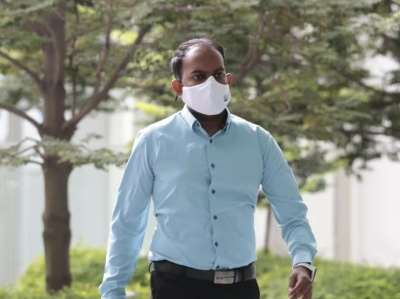SINGAPORE, June 21 — While serving as an investigating officer in the Singapore Police Force, Willjude Vimalraj Raymond Suras forged statements that he was tasked to take from witnesses for investigation.
On at least one occasion, he called a person over the phone and took notes before crafting his own statement based on the notes he took and backdating the document to meet an overdue deadline. Another time, he submitted a statement without interviewing the person directly.
After resigning from the police force, he applied to be called to the Singapore Bar as a lawyer. During this application, he falsely declared that he was not under investigation, even though he was being investigated by the police for the said forgery offences.
On Thursday (June 20), the 33-year-old Singaporean was sentenced to 25 months’ jail after pleading to nine charges of forgery and one of intentionally giving false evidence in a judicial proceeding.
Advertisement
Another 29 forgery charges were taken into consideration for sentencing.
The court heard that Willjude’s supervisor in the police force had found his performance to be poor and spoke to him on several occasions, without seeing any progress after that.
He was with the Woodlands Police Division at the time.
Advertisement
When reviewing his case files on Jan 26 in 2019, the supervisor saw that identical statements were recorded from two witnesses for two unrelated cases.
Deputy Public Prosecutor (DPP) Grace Chua said that this led the supervisor to suspect that the statements may have been forged.
“She called the witnesses to check if the accused had recorded statements from them and was told that he did not,” DPP Chua added.
When questioned, Willjude admitted to forging the statements.
A “thorough” review of all his case files uncovered 38 forged statements across 21 case files.
Some of the affected cases were re-investigated where necessary, with fresh statements taken.
“It was found that all case outcomes were not affected by the forgeries,” DPP Chua said.
On one occasion, Willjude was handed a case in November 2018 but failed to record statements from the two witnesses involved despite being given time extension until Jan 5, 2019.
The day before the extended deadline, he called one witness over the phone, took notes and wrote up a statement based on his own notes. He did not call the other witness and penned his own statements.
For both forged documents, he wrote the date as Dec 30, 2018 in order to give the impression that they were recorded before the deadline.
For another case that he was assigned sometime in January 2019, he was tasked to interview two persons.
However, he “felt that there was no need to do so” and instead forged their statements, aligning the contents to the statements of two other witnesses he had earlier interviewed, DPP Chua said.
Willjude resigned from the police force on April 19 in 2019 while investigations for his forgery offences were ongoing.
Law-trained, he applied to be admitted as an advocate and solicitor. When submitting a sworn affidavit dated Dec 22, 2020, he gave false evidence by declaring that he was not under any investigation.
A senior consultant at the Institute of Mental Health (IMH) diagnosed Willjude with adjustment disorder, which later evolved into major depressive disorder.
The doctor found a contributory link between Willjude’s mental condition and his forgery offences, but no contributory link between the condition and the offence of giving false evidence.
Seeking a total sentence of 30 months’ jail, DPP Chua said that the need for general deterrence “applies with a special force” for law enforcement officers who break the law and abuse public trust in the course of their duty.
The forgeries committed also have the potential to “shake public confidence” in the police, she added.
She also mentioned that some aggravating factors were the calculated manner in which Willjude committed the offence, as well as the extensive efforts to track his forgeries and re-investigate the affected cases.
Defence lawyer Azri Imran Tan highlighted his client’s psychiatric condition as a mitigating factor in asking for a lower sentence of between 12 and 17 months behind bars.
He argued that Willjude’s offending behaviour was “out of character” and quoted the IMH doctor’s report, which stated that Wulljide was working in a “toxic and depressogenic” environment under the supervisor that reported his offence.
Depressogenic describes something that could cause someone to develop depression.
The inspector was “driven to overwhelming depressive despair, for instance, to act in ways which he would not when mentally healthy”.
Mr Tan added, though, that no aspersion is being cast against his client’s supervisor or the police force, but he was just setting out the conditions that had affected Willjude at that time.
For each count of forgery, Willjude could have been sentenced to a jail term of up to four years or fined, or both.
For giving false evidence in a judicial proceeding, he could have been jailed up to seven years and also been fined. — TODAY

